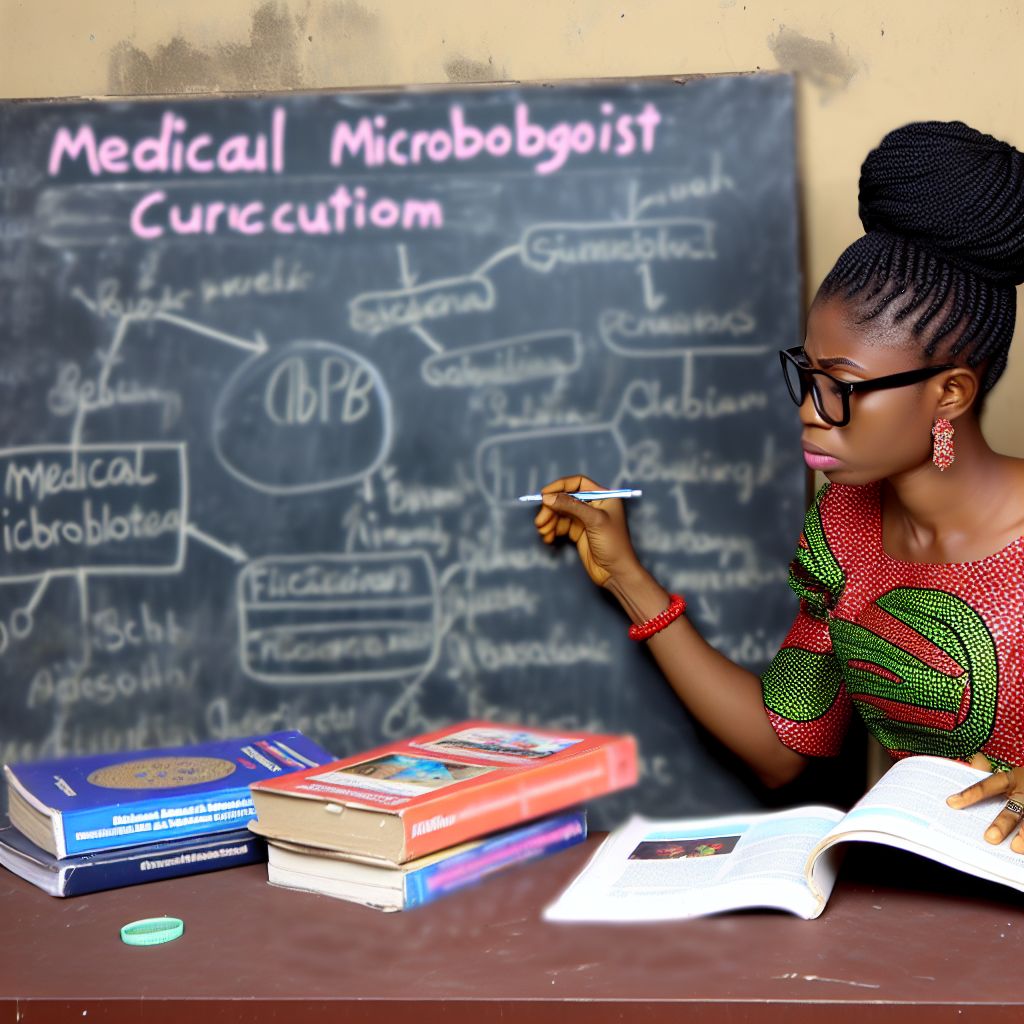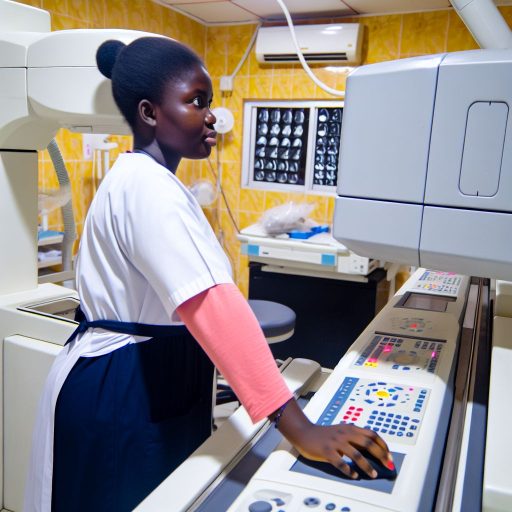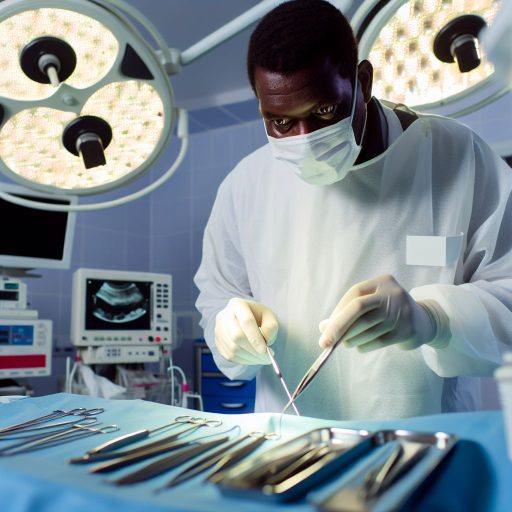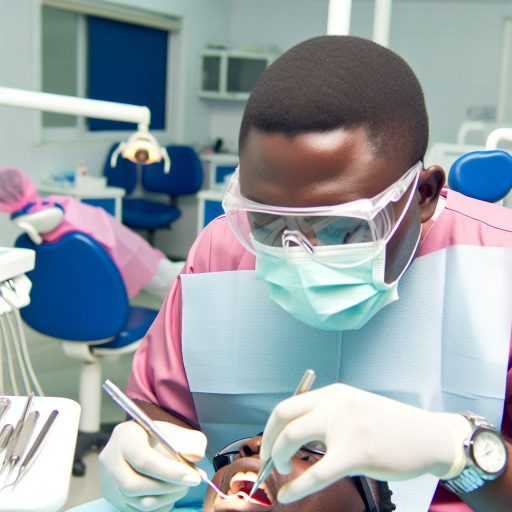Introduction:
Medical microbiology is the study of microorganisms that cause diseases in humans.
It focuses on understanding the mechanisms of infection and how to prevent, diagnose, and treat these infections.
Medical microbiology plays a crucial role in healthcare by providing insights into the causes of diseases, identifying pathogens, and guiding treatment strategies.
It helps in the development of vaccines, antibiotics, and other therapeutics.
In Nigeria, the curriculum of medical microbiology encompasses a wide range of topics such as bacteriology, virology, parasitology, and mycology.
Students learn about the identification, prevention, and treatment of various microbial infections.
Overview of Medical Microbiology Curriculum:
Core courses included in the curriculum:
The Medical Microbiology curriculum in Nigeria typically includes courses such as Introduction to Microbiology, Immunology, Virology, Bacteriology, and Mycology.
Practical training and laboratory sessions:
Students are required to participate in hands-on laboratory sessions to develop essential skills in microbiological techniques.
Emphasis on hands-on experience and research:
The curriculum places a strong emphasis on practical experience and research to prepare students for real-world applications in the field.
Integration of current trends and advancements in the field:
The curriculum is designed to incorporate the latest advancements and trends in medical microbiology to ensure students are up-to-date with the rapidly evolving field.
Challenges in Implementing the Curriculum:
- Lack of well-equipped laboratories:
Without proper facilities, students cannot gain practical experience. - Shortage of qualified instructors:
Skilled professionals are essential for imparting knowledge effectively. - Limited funding for research and development:
Insufficient resources hinder the growth of medical microbiology education. - Inadequate integration with other healthcare disciplines:
Collaboration is crucial for a holistic approach to healthcare.
One of the major challenges in implementing the medical microbiology curriculum in Nigeria is the lack of well-equipped laboratories.
Practical training is a crucial component of microbiology education.
Students need hands-on experience to fully understand concepts and techniques.
However, many educational institutions in Nigeria struggle with inadequate laboratory infrastructure.
This limits the quality of education that students receive.
Another significant challenge is the shortage of qualified instructors.
Skilled professionals are essential for teaching complex subjects like microbiology effectively.
Without experienced instructors, students may not receive the guidance and support they need.
Addressing this issue requires a concerted effort to attract and retain talented individuals.
Furthermore, limited funding for research and development poses a significant obstacle.
Research is crucial for expanding our understanding of pathogens.
Antimicrobial resistance and emerging diseases are vital areas of study.
However, without sufficient resources, educational institutions struggle to conduct meaningful research.
Securing funding for research projects is essential.
This will enhance the curriculum and keep it up-to-date with the latest developments.
Additionally, the inadequate integration of medical microbiology with other healthcare disciplines is a challenge.
Healthcare is a multidisciplinary field.
Collaboration between different specialties is essential for comprehensive patient care.
Medical microbiology plays a crucial role in diagnosing infectious diseases.
Its integration with other disciplines is essential for a holistic approach.
However, the siloed nature of healthcare education in Nigeria hinders such collaboration.
Addressing these issues requires a collaborative effort.
Educational institutions, government bodies, and healthcare professionals must work together.
Improving laboratory infrastructure is a necessity.
Attracting qualified instructors must be prioritized.
Securing funding for research and development is crucial.
Transform Your Career with Expert Guidance
Get personalized mentorship consulting that’s tailored to your unique path. Our expert advice is actionable and exclusive.
Get StartedPromoting integration with other healthcare disciplines should be a goal.
By overcoming these challenges, Nigeria can enhance medical microbiology education.
This will better prepare future healthcare professionals to address the country’s healthcare needs.
Gain More Insights: Benefits of Social Medicine in Rural Nigerian Areas
Strategies for Improving the Curriculum:
- Collaboration with international institutions for training and resources.
- Increased government funding and support.
- Continuous professional development for instructors.
- Integration of technology for virtual learning and research.
Collaboration with international institutions can bring in new perspectives and best practices in medical microbiology education.
This partnership can lead to the exchange of faculty members, joint research projects, and access to state-of-the-art facilities and equipment.
By tapping into the expertise of experts from around the world, students can benefit from a more comprehensive and global approach to their learning.
Increased government funding and support are crucial for the success of the medical microbiology curriculum in Nigeria.
Adequate funding can help in the development of modern laboratory facilities, the procurement of updated textbooks and teaching materials, and the organization of training workshops and conferences.
Government support can also lead to the establishment of scholarship programs for students pursuing medical microbiology studies, making education more accessible to a wider range of learners.
Continuous professional development for instructors is essential to ensure that they are up-to-date with the latest advancements in the field of medical microbiology.
Workshops, seminars, and conferences can provide opportunities for educators to enhance their teaching skills, learn about new research findings, and network with other professionals in the field.
By investing in the growth and development of instructors, the quality of teaching in medical microbiology programs can be greatly improved.
Integration of technology for virtual learning and research can revolutionize the way medical microbiology is taught in Nigeria.
Online platforms, virtual labs, and simulation software can provide students with practical experience and exposure to real-world scenarios in a controlled environment.
By incorporating technology into the curriculum, students can develop essential skills in data analysis, research methodologies, and critical thinking, preparing them for careers in research, academia, or clinical practice.
By implementing these strategies for improving the medical microbiology curriculum in Nigeria, educators can enhance the quality of education, provide students with a more enriching learning experience, and better prepare them for the challenges of the modern healthcare landscape.
Collaboration with international institutions, increased government funding, continuous professional development for instructors, and the integration of technology are essential components for ensuring the success and relevance of the curriculum in the ever-evolving field of medical microbiology.
Discover More: Patient Rights and Dental Care Standards in Nigeria
Success Stories in Medical Microbiology Education:
- Highlight of successful graduates in the field.
- Recognition of institutions with effective curriculum implementation.
- Impact of research and publications from Nigerian medical microbiologists.
- Improved healthcare outcomes attributed to well-trained medical microbiologists.
Successful Graduates in Medical Microbiology
Several Nigerian graduates of medical microbiology have gone on to have successful careers in the field.
These individuals have made significant contributions to research, healthcare, and academia both locally and internationally.
One notable success story is Dr. Adebayo, who graduated top of his class from a renowned Nigerian institution.
He went on to pursue a Ph.D. in medical microbiology and is now a leading researcher in the field.
Another graduate, Dr. Oni, established a diagnostic laboratory that has become a key player in diagnosing infectious diseases in Nigeria.
Her work has helped improve disease surveillance and control in the country.
Institutions with Effective Curriculum Implementation
Certain institutions in Nigeria have been recognized for their outstanding medical microbiology curriculum implementation.
These institutions prioritize hands-on practical training, research opportunities, and collaboration with healthcare facilities.
The University of Lagos, for example, has a structured curriculum that integrates theory with practical skills.
Students have access to state-of-the-art laboratories and are encouraged to participate in research projects that have real-world applications.
The University of Ibadan is another institution known for its comprehensive medical microbiology program.
Graduates from this university are well-prepared for careers in research, clinical practice, and public health.
Impact of Research and Publications
Research and publications by Nigerian medical microbiologists have made a significant impact on the field.
Studies on antibiotic resistance, infectious disease epidemiology, and novel diagnostic techniques have advanced healthcare practices in the country.
Publications from Nigerian researchers have been cited globally and have influenced medical guidelines and protocols.
This research has also sparked collaborations with international organizations and institutions, leading to innovative solutions to public health challenges.
Improved Healthcare Outcomes
Well-trained medical microbiologists play a crucial role in improving healthcare outcomes in Nigeria.
Their expertise in diagnosing and managing infectious diseases has led to better patient care, reduced mortality rates, and improved disease surveillance.
Medical microbiologists are at the forefront of combating infectious disease outbreaks and antimicrobial resistance.
Their contributions to research, surveillance, and treatment strategies have resulted in more effective public health interventions and a healthier population overall.
You Might Also Like: Restorative Dental Care for Special Needs Patients

Future Prospects and Trends in Medical Microbiology:
- Emerging infectious diseases and their impact on curriculum development.
- Integration of genomics and bioinformatics into the curriculum.
- Shift towards personalized medicine and precision microbiology.
- Opportunities for collaboration with pharmaceutical companies and research institutions.
1. Emerging Infectious Diseases and Their Impact on Curriculum Development
In recent years, we have witnessed the rise of new and re-emerging infectious diseases that pose significant challenges to global health.
These emerging pathogens, such as the Zika virus and Ebola virus, highlight the need for a robust medical microbiology curriculum that can adequately prepare healthcare professionals to address these threats.
As these infectious diseases continue to evolve and spread, it becomes crucial for medical microbiology curricula in Nigeria to adapt and incorporate the latest information on these pathogens.
This may involve updating course materials, integrating case studies on recent outbreaks, and providing students with hands-on experience in diagnosing and managing these infections.
Additionally, the emergence of antimicrobial resistance further underscores the importance of equipping future microbiologists with the knowledge and skills to combat these evolving threats.
Curriculum development should focus on antimicrobial stewardship, surveillance of resistant organisms, and strategies for infection prevention and control.
2. Integration of Genomics and Bioinformatics into the Curriculum
Advancements in genomics and bioinformatics have revolutionized the field of medical microbiology, offering new insights into the genetic makeup of pathogens and facilitating the development of targeted therapies.
To remain at the forefront of these technological advances, the medical microbiology curriculum in Nigeria should incorporate training in these areas.
By integrating genomics and bioinformatics into the curriculum, students can learn how to analyze microbial genomes, identify virulence factors, and predict antibiotic resistance patterns.
This knowledge will enable them to apply precision medicine approaches, tailoring treatment strategies to the individual characteristics of each patient and pathogen.
Furthermore, understanding genomics and bioinformatics will enhance students’ ability to contribute to research efforts aimed at developing novel vaccines, diagnostics, and therapeutics.
Collaborations with research institutions and pharmaceutical companies can provide valuable opportunities for students to engage in cutting-edge research and contribute to the advancement of medical microbiology.
3. Shift Towards Personalized Medicine and Precision Microbiology
The concept of personalized medicine, which involves tailored healthcare based on an individual’s genetic, environmental, and lifestyle factors, is gaining momentum in the field of medical microbiology.
This shift towards precision medicine presents new opportunities for curriculum development in Nigeria.
Incorporating personalized medicine principles into the medical microbiology curriculum can empower students to practice patient-centered care, utilizing diagnostic techniques and treatment modalities that are customized to each patient’s unique characteristics.
By emphasizing the importance of individualized approaches to infectious disease management, students can enhance their clinical decision-making skills and optimize patient outcomes.
Moreover, the integration of precision microbiology techniques, such as next-generation sequencing and molecular diagnostics, can improve the accuracy and efficiency of pathogen identification and characterization.
By training students in these cutting-edge technologies, the curriculum can prepare future microbiologists to deliver precise and targeted interventions for infectious diseases.
4. Opportunities for Collaboration with Pharmaceutical Companies and Research Institutions
Collaboration with pharmaceutical companies and research institutions presents valuable opportunities for enriching the medical microbiology curriculum in Nigeria.
By partnering with industry experts and leading researchers, students can gain insights into the latest trends, technologies, and best practices in the field.
Engaging with pharmaceutical companies can expose students to the drug development process, regulatory requirements, and the role of microbiology in pharmaceutical research and development.
This hands-on experience can broaden students’ understanding of the practical applications of medical microbiology and inspire them to pursue careers in industry or academia.
Similarly, collaboration with research institutions can provide students with access to cutting-edge research projects, laboratory facilities, and mentorship opportunities.
By participating in research activities, students can enhance their scientific skills, expand their knowledge of microbiology, and contribute to the advancement of the field through innovative discoveries and publications.
Overall, the future prospects and trends in medical microbiology hold great promise for the advancement of healthcare in Nigeria.
By embracing emerging technologies, integrating personalized medicine principles, and fostering collaboration with industry and research partners, the medical microbiology curriculum can prepare students to address current and future challenges in infectious disease management and contribute to improved patient outcomes.
Discover More: Impact of Anatomy Studies on Nigerian Medical Practice
Importance of Medical Microbiology in Healthcare
Medical microbiology plays a crucial role in healthcare by identifying and treating infectious diseases promptly.
Stakeholders in Nigeria should actively support and enhance the medical microbiology curriculum to ensure quality education.
With a robust curriculum, Nigerian medical microbiologists can make significant contributions to global health challenges in the future.
Additional Resources
How to get into medical school in the US from Nigeria (I’m an …




